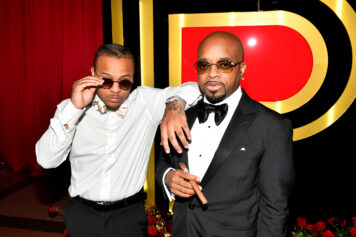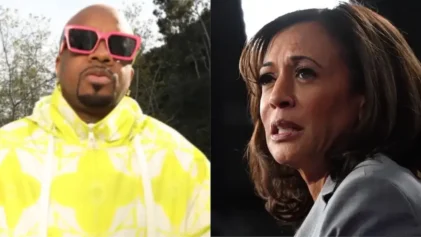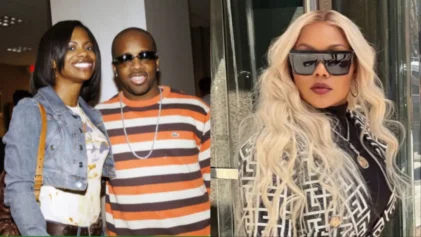Chart-topping rapper Latto is enjoying her spot as one of the most exciting female rappers in the industry. Representing Gen Z’s, she appeared on Jermaine Dupri’s “Rap Game” on the Lifetime network in 2016 at the age of 16, becoming the hit show’s first winner.
Between the historic win, her debut projects, a series of mixtapes put out by Pittstop Entertainment, a label run by her parents, Misti Pitts and Shayne Stephens, and her debut studio album, “Queen of da Souf,” in 2020, the Billboard Music Award winner has insisted that she never signed a deal with the show’s producer’s label, So So Def.
In an interview with Baller Alert, Dupri talked to hosts Ferrari Simmons & You Know BT about the narrative spun by the “Put it On The Floor Again” rapper.
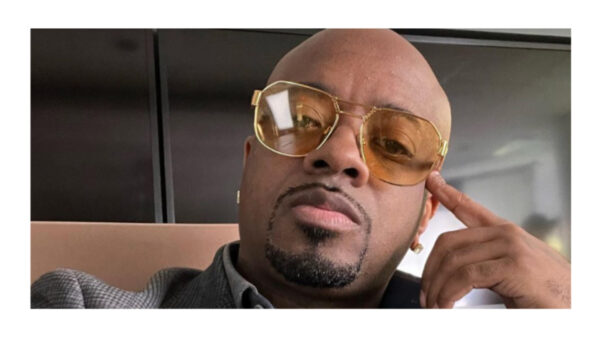
While talking about the show, he mentioned how all of the contestants were automatically signed to his label and that his goal was always to give them a platform to explode onto the music scene — particularly since he has been successful with kids acts like Kriss Kross, Bow Wow and Xscape.
For him, through the automatic signing, he was “molding” the careers of the acts, the same way that “American Idol” does.
He said that he did everything that he should have done with the cast members of the show. In addition to the weekly series, he also put them on tour and on various radio programs. However, he claims neither Epic or Capital Records, the two labels he was affiliated with at the time, believed in his vision or supported his “Rap Game” movement.
The “Money Ain’t a Thing” rapper said the tour was a pivotal point for some of the artists, specifically Latto.
“I did the tour and the tour actually wasn’t the greatest success. It was some cities that were sold out and other cities that didn’t sell,” he said. “That’s where the friction became between Latto and my dad, and I guess Latto’s dad [music executive Michael Maulden].”
According to Dupri, there was an expectation for Latto to be paid, even though there were no butts in the seats and he took a loss, in addition to her having no music on the radio. Latto would then start going to the media and talking about him. For him, it was just a big misunderstanding because her reps didn’t really understand the business.
“I had people say, ‘How you just let Latto go?’” he said, “You think I just let her go do whatever?”
Dupri continued, “It was some cap that was going around … it was saying that I offered her a deal and she didn’t take it.” The rumor was that he offered her $10,000. He said that was a lie.
“If I offer somebody a deal, that don’t have a deal … you don’t even have no interest,” he explained, adding further “Two labels, they already had her. … Because she was signed to me. … So, Epic already had her. … Wasn’t nothing you could possibly do. When you signed the deal with the TV show, inside that contract, the artist go signed to Jermaine, without you even winning. The contract says I have you as an artist signed to So So Def. So, I didn’t have to make a deal.”
The story told by the femcee is an inaccurate spin on the truth, according to Dupri.
Fans weighed in on Dupri’s explanation.
“That’s a slick way to own the rights to the artist,” one person wrote on YouTube. Another wrote, “What he just explained is even worse. They was basically tricking people into contracts.”
One comment understood it was business, saying, “These people had no exposure he paid her 10k to give her exposure.”
A fourth comment said this business deal backfired on him.
“That man knew what he was doing look at Latto now…he made them sign those deals because he gave them a platform,” a YouTuber wrote under a clip.
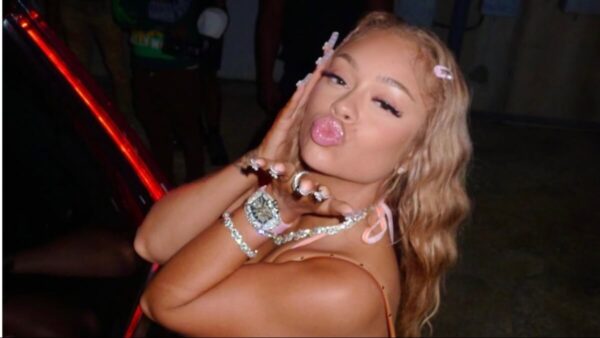
Working with stars like Mariah Carey, DJ Khaled, Cardi B and even Asian acts like Jungkook, Latto, whose real name is Alyssa Michelle Stephens, attributes none of her success to the person who put her on screen for millions to view each week.
She said she declined an offer to sign with So So Def because the deal was not good enough for her.
In an interview with VladTV conducted sometime after the show was over, she said, “Even though I was a kid in the industry, I never conducted myself like a kid. I took everything for what it was. I was never starstruck or anything like that.”
A part of that confidence was the result of her and her family being self-sufficient, she says. She said in the interview she was booked and busy.
Terms for her to sign the deal, she said, had to be something that she couldn’t have done for herself.
“I can pay for video shoots; I can pay for studio time. I have my own studio as well,” Latto said, noting that she won money from the competition and had already learned how to monetize her fame and booking her own shows.
She also said that she invested her money in a retail show and a studio, making sure her entrepreneurship funded her music dreams until she would get signed to a major label.
“My mom handles all my finances, everything behind the scenes, and my dad is here with me; he’s my manager,” she shared. “I have to feel comfortable around you. I’m not a product. I am a product but don’t treat me like a product. A lot of people in the industry, they just want to see their money in their bank account grow; they don’t look at you as a human being.”
Latto is not the first artist to claim they were never signed to JD despite his claim otherwise. Yung Joc recently cleared this up on “The Culture Club Uncensored” with Osei the Dark Secret.
Dupri was under the impression that the “Love and Hip Hop: Atlanta” cast member was signed to him because Nitti Beatz, the producer of his first big song, told him that Joc was. However, the “It’s Going Down” rapper opted to sign with Sean “Diddy” Combs’ Bad Boy South.
Not to be outwitted by the rapper, Dupri sent a cease-and-desist letter to the artist for using the song with the So So Def tag. The producer required Bad Boy to pay him $60,000 because the song was on already on the streets and picking up steam.
“I didn’t actually sign him. It’s like you signed to me, I know you are going to do the right thing and you have already said ‘So So Def’ at the beginning of the record,” he said.
To this day, the “Welcome to Atlanta” artist is still upset at the duping, and Latto is a reminder that just because you use your brand to elevate someone else that doesn’t buy unconditional loyalty.
